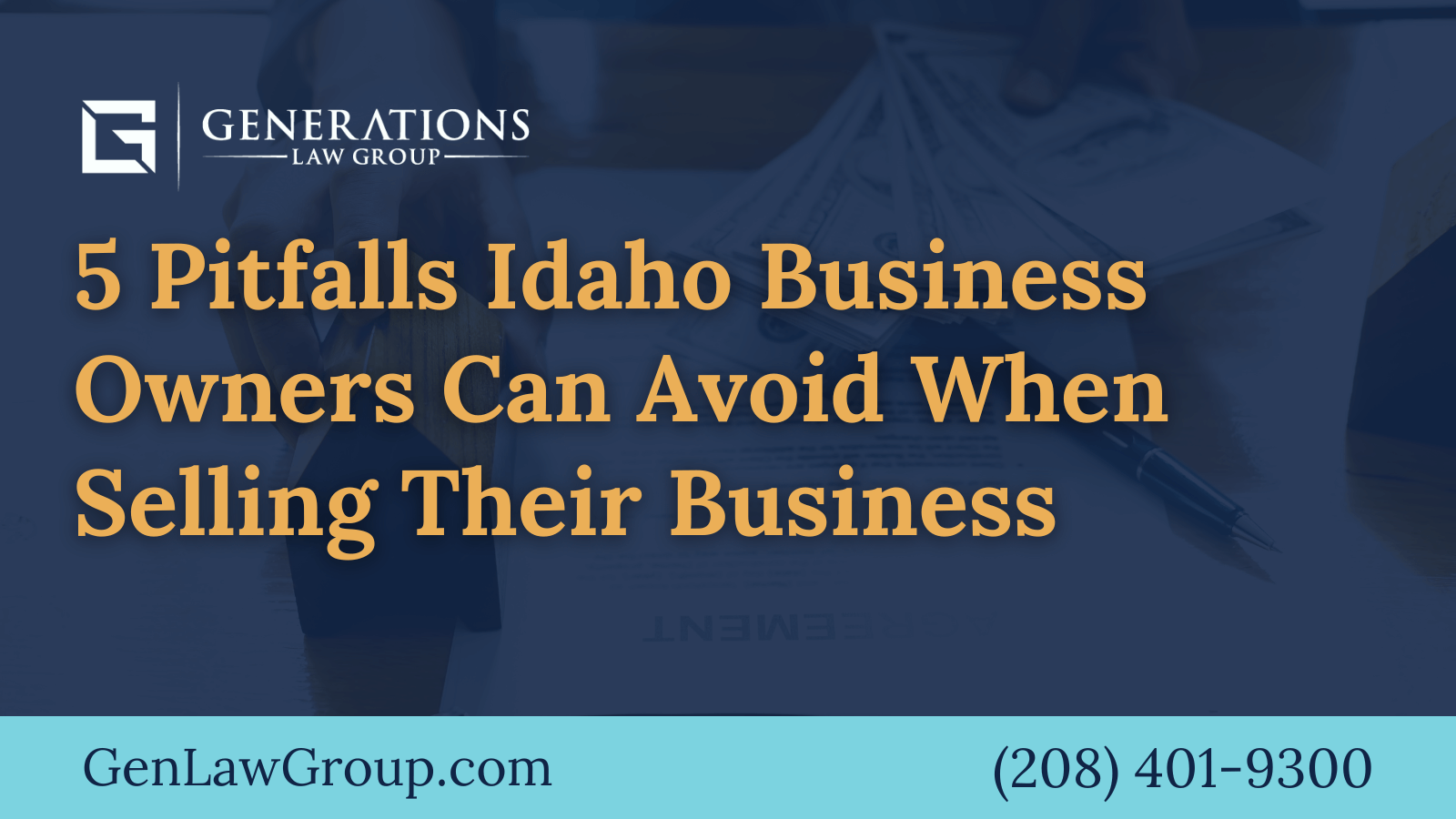If you’re thinking about selling your Idaho business or you have decided to sell…congratulations.
You have most likely invested many years of building and growing it into something of value which should bring you a nice retirement. While this is the goal of most businesses, it isn’t always achieved.
When businesses don’t succeed, it’s not always because of the type of business, age of the business, or other business factors — but rather because of other factors that can have a significant impact on the eventual sale of the business.
We often see 5 very distinct areas where these pitfalls can be avoided if the owner(s) take note of these areas in advance. From the Idaho business attorneys here at Generations Law Group, here are 5 things business owners should consider when selling a business.
1. Planning earlier than you think
This is probably the number one area business owners fail in when it comes to selling their business: They start the process later than they should.
As some experts will tell you, you start thinking about selling the business the day you start your business — having the end in mind from the start helps shape your decisions moving forward. It sounds a bit unrealistic, but it’s not far from the truth.
Designing your Idaho business with an exit strategy from the beginning or early stages is one way to help maximize the return on your business and be prepared along the way.
I always like to think of “what if’s” as well. For example, what if someone showed up tomorrow and offered to buy your business? Would you be ready or even have an idea of what would be a fair price if you wanted to sell? Most business owners don’t, and they haven’t thought about this until they decide they want to sell it.
Think about someone walking in tomorrow, and you’ll be much more prepared today.
2. Getting what the business is worth
How much do you think your business is worth?
Generally, this number is off…either too high or too low. It’s hard to get exact unless you have some data and input as to how to value the business. Often times owners think it is worth more than the market so getting someone who knows how to value the business is very helpful in understanding what someone would most likely pay for it.
One thing I recommend is to get a valuation for your business frequently, not just when you want to sell it.
Why? Because if it comes in lower than you would like, then you can look at it strategically and with outside assistance and figure out what needs to be changed to increase its value of it over the next few years. You can’t change the value instantly so if you have some time to plan for the changes it will pay off with a stronger price in the end — and well worth the cost of the valuation.
3. Who is your buyer?
Knowing who the buyer is and if they are truly capable of running the business is pretty important for a variety of reasons — especially if you are carrying the note on it for some time into the future.
If it’s a cash-out deal, this isn’t as important because you are gone completely with no strings attached.
But if you get some stock and cash or you get a note for a few years, this is critically important. You don’t want a buyer that will run your business into the ground, and you increase your risk of getting paid or lower your future returns.
Do your homework on the potential buyers early. Know who they are and what they have or haven’t done in business before.
4. Are your employees holding you back?
Another area that can keep the value of your business down or maybe even keep it from selling (especially for a high price) could be your employees and leadership team.
If there are weak links in the organization, a potential buyer can sniff those out and realize their risk is higher and thus the price should be lower since they will probably have to replace some key people.
Having a strong team increases both the speed of a sale and the price of the sale since it is lowering the risk for the potential buyers.
5. Who are your customers?
One important aspect of buying just about any business is the customers of the business.
If you have star customers and they love doing business with you (possibly paying a premium to work with you), this will increase the speed of sale and the value. One thing a potential buyer wants to know is the quality of the customer base. If they feel it is marginal, the risk goes up and the price goes down. If they feel you have stellar customers and relationships with those customers, you can expect to get a higher price.
One thing any buyer will factor in is customer turnover on sale. The higher percentage of customers the buyer feels will leave the higher the risk to the business. When you invest time in attracting and retaining a strong loyal customer base, you will reap the rewards when you sell.
Contact Generations Law Group to get started on selling your business
I hope you have found this helpful and given you a different way to look at your business. If you would like to learn more about planning to sell your business, my team at Generations Law Group would be happy to talk you through what the process can look like. Our primary mission is to help everyone find productive ways to lower their business AND personal risk. Contact us today to schedule a consultation and let’s make sure your risk is as low as it can be while you continue to grow.



